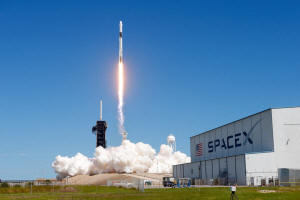|
The launches include the Euclid space telescope and the Hera
probe, a follow-up mission to NASA's DART spacecraft which last
month succeeded in altering the path of a moonlet in the first
test of a future planetary defence system.
"The member states have decided that Euclid and Hera are
proposed to be launched on Falcon 9," ESA Director General Josef
Aschbacher told reporters after a meeting of the 22-nation
agency's ministerial council.
The launches will take place in 2023 and 2024 respectively.
Reuters reported in August that ESA had begun preliminary
technical discussions with SpaceX that could lead tothe
temporary use of its launchers after the Ukraine conflictblocked
Western access to Russia's Soyuz rockets.
Industry sources had said up to two launches could be affected
by the switch from Soyuz to SpaceX.
A third payload which had been due to ride on Soyuz - the Earth
Cloud Aerosol and Radiation Explorer, or EarthCARE - will now be
launched on Europe's Vega C instead, Aschbacher said.
Built by Airbus on behalf of the European and Japanese space
agencies, the EarthCARE satellite will be launched in early 2024
to fill a gap in the scientific modelling of climate change.
ESA is still looking for alternatives for two further missions
that had been in the Soyuz launch pipeline.
Aschbacher made the announcement a day after ESA revealed a new
fourth-quarter 2023 target for the first launch of Ariane 6, its
latest launch vehicle, marking a delay of about six months.
ESA had previously said Ariane 6 could slip into 2023 from 2022
without giving a more precise window, but it was widely
understood to be aiming for early next year.
Originally due to make its first launch in 2020, the
twin-variant Ariane 6 was developed to counter lower-cost
competition from SpaceX and preserve Europe's independent access
to space.
Europe has until now depended on the Italian Vega for small
payloads, Russia's Soyuz for medium ones and the near-retirement
Ariane 5 for heavy missions.
ESA said on Wednesday it planned to launch the three remaining
Ariane 5 rockets in the first half of next year.
(Reporting by Tim Hepher; Editing by Alison Williams)
[© 2022 Thomson Reuters. All rights
reserved.]
This material may not be published,
broadcast, rewritten or redistributed.
Thompson Reuters is solely responsible for this content.

|
|




